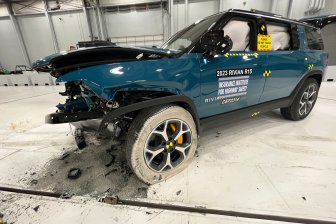Why ‘Taiwan’s fight is Canada’s fight’ amid Chinese aggression
A delegation of Canadian politicians met with the president of Taiwan in Taipei Wednesday to discuss the Chinese government’s military aggression and allegations of foreign interference.
“Even as we arrived here, there’s 160 warplanes flying overhead and they’re carrying on naval exercises,” said Liberal MP John McKay, referencing this week’s Chinese military exercises.
“Our message to them is that Taiwan’s fight is Canada’s fight,” he said.
Read more:
Canadian MPs arrive in Taiwan in latest show of Western support after Tsai’s U.S. trip
The 10 Canadian MPs included representatives from the Liberals, Conservatives, NDP and Bloc Quebecois. They wore pins on their lapels bearing the Taiwanese and Canadian flags and were greeted with a warm smile and handshakes by President Tsai Ing-wen.
“Canada is a very important democratic partner,” Tsai told the delegation from her podium in a briefing room inside the Presidential Office Building.
“Faced with continued authoritarian expansionism, it is even more critical for democracies to actively unite.”
A delegation of Canadian MPs poses for a photo after arriving in Taipei, Taiwan on April 10, 2023.
Canadian Trade Office in Taipei/Facebook
The Canadian MPs presented Tsai with a hardcopy of a report that passed unanimously last month by the House of Commons’ special committee on Canada-China relations, which called for closer ties with Taiwan and an end to Chinese military encroachment.
Previous visits by Canadian politicians to Taiwan, like the one last year, have largely focused on issues such as trade. But the conversation on this trip carried a much starker tone.
Taiwan’s representative in Canada, Harry Ho-jen Tseng, who travelled with the delegation, said Taipei’s relationship with Ottawa is being reshaped by an increasingly bold and brazen Beijing.
“Even though the relations between Canada and Taiwan have been very comprehensive over the past years, at this particular point of time, the security issue and national defence seem to be more important than anything else,” Tseng told Global News in Taipei.

The Canadian delegation’s security concerns centre on the Chinese government’s alleged foreign interference in Canada’s elections. During their week-long visit to the Taiwanese capital, which is being funded by Taipei, the Canadian MPs toured the offices of an NGO called Doublethink Lab, one of many groups that have sprung up in recent years to fact-check and debunk disinformation and Chinese government propaganda targeting Taiwan.
“Taiwan is kind of ground zero for Chinese disinformation,” said Ai-Men Lau, a Canadian research analyst who works for the NGO.
“I think it’s quite striking being here in Taiwan, seeing how Taiwanese civil society has really risen up to address the issue.”

Michael Chong, the Conservative foreign affairs critic and a member of the delegation, said Canada can learn from the Taiwanese experience.
“Taiwan has long been subject to foreign interference from Beijing,” he said. “There are a lot of lessons we can learn in how the Taiwanese government has built resilience in its population and its citizens and society against this foreign interference.”
Opinion polls have consistently shown the vast majority of Taiwan’s citizens want to remain a democracy and separate from China. But these high-profile meetings with democratic world leaders have at times proved polarizing here.
Read more:
China planning to close airspace for brief period, Taiwan says
After Tsai met last week with top U.S. officials, including House Speaker Kevin McCarthy, the Chinese government launched three days of military exercises around Taiwan, involving dozens of warplanes and ships.
Some Taiwanese feel the diplomatic photo-ops aren’t worth Beijing’s wrath.
“This issue has been divisive in Taiwan, because some think this is too provocative against China,” said James Yifan Chen, an assistant professor at the Department of Diplomacy and International Relations of Tamkang University in Taipei.
“Mostly, we want to maintain a so-called status quo.”

The leader of Taiwan’s pro-China reunification party and convicted former gang leader, Chang An-lo, said the Canadian delegation should go home.
“They should mind their own business and solve their own problems before talking about these things. They need to reflect on themselves,” he said, pointing to the Canadian government’s mistreatment of Indigenous people.
“Maybe I should tell Canada how to deal with its Indigenous people,” he said.
The Chinese embassy in Ottawa has so far not commented on the Canadian delegation in Taiwan. When asked by Global News whether they were concerned their visit might further provoke the Chinese government against Taiwan, the MPs shook their heads.
“Not at all, because these visits are part of a long-standing policy for decades amongst democracies of sending parliamentary delegations to Taiwan,” said Chong.
“What has changed is Beijing’s position. They’ve become increasingly belligerent. And we can’t appease that behaviour by kowtowing to it.”
© 2023 Global News, a division of Corus Entertainment Inc.
For all the latest World News Click Here
For the latest news and updates, follow us on Google News.




